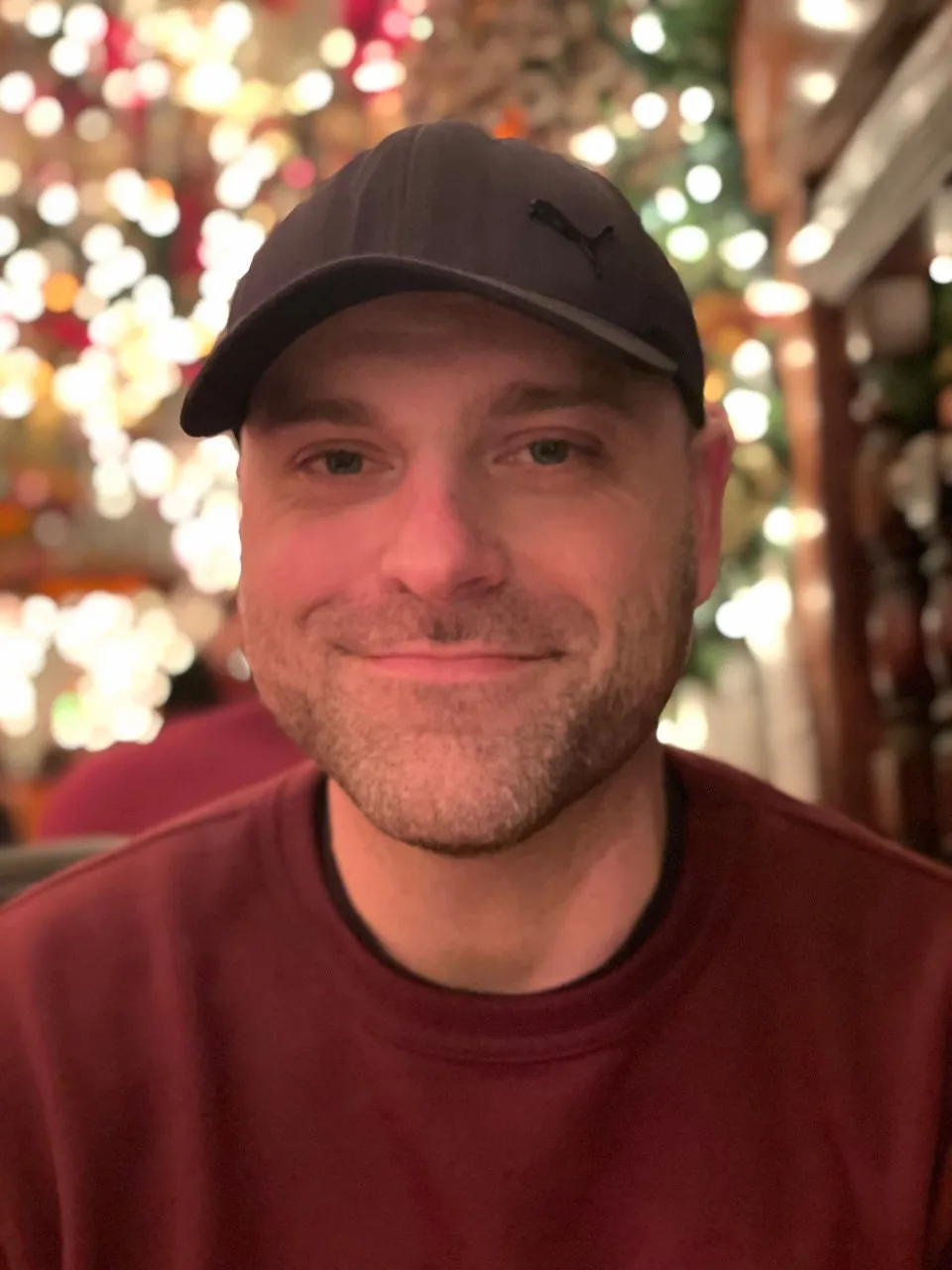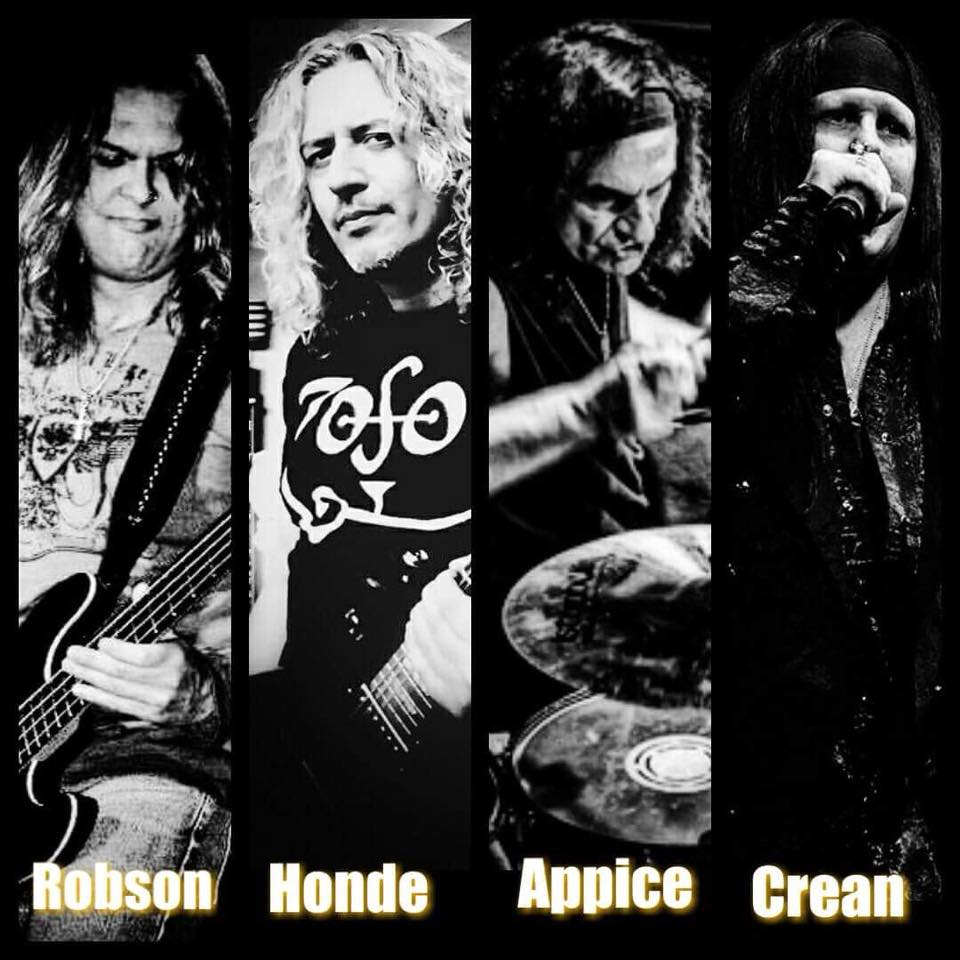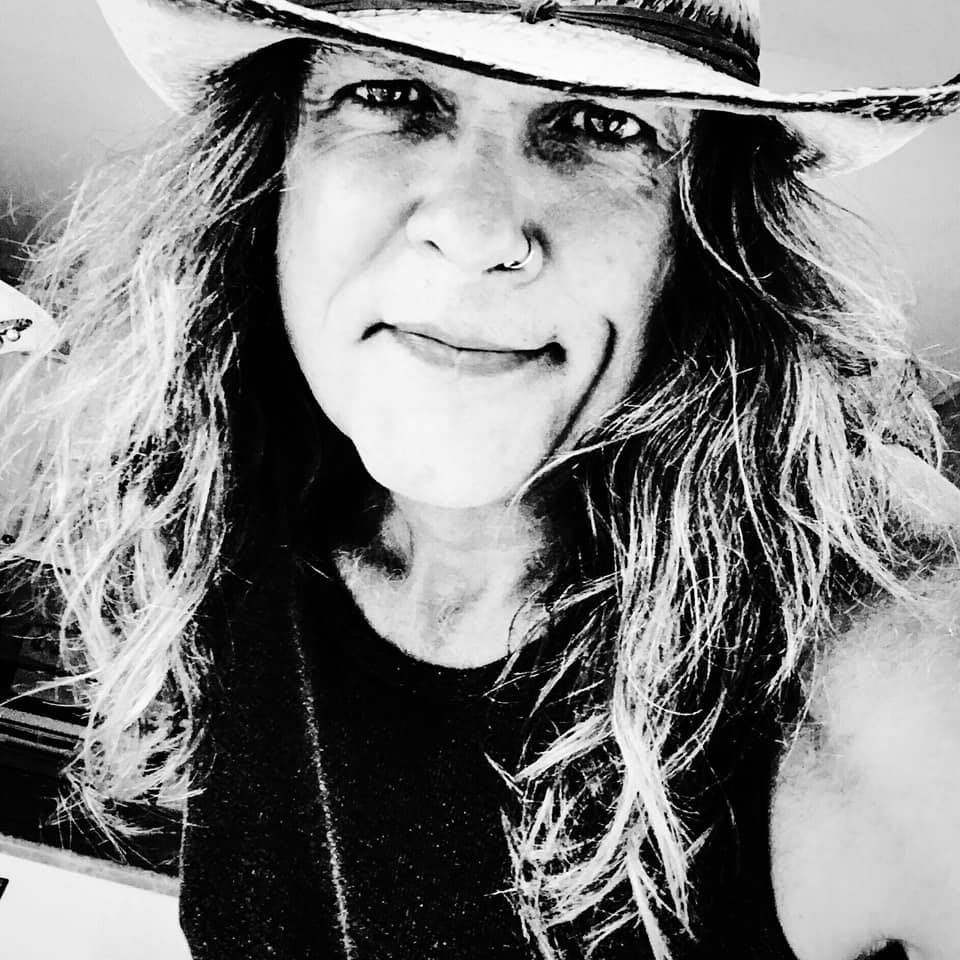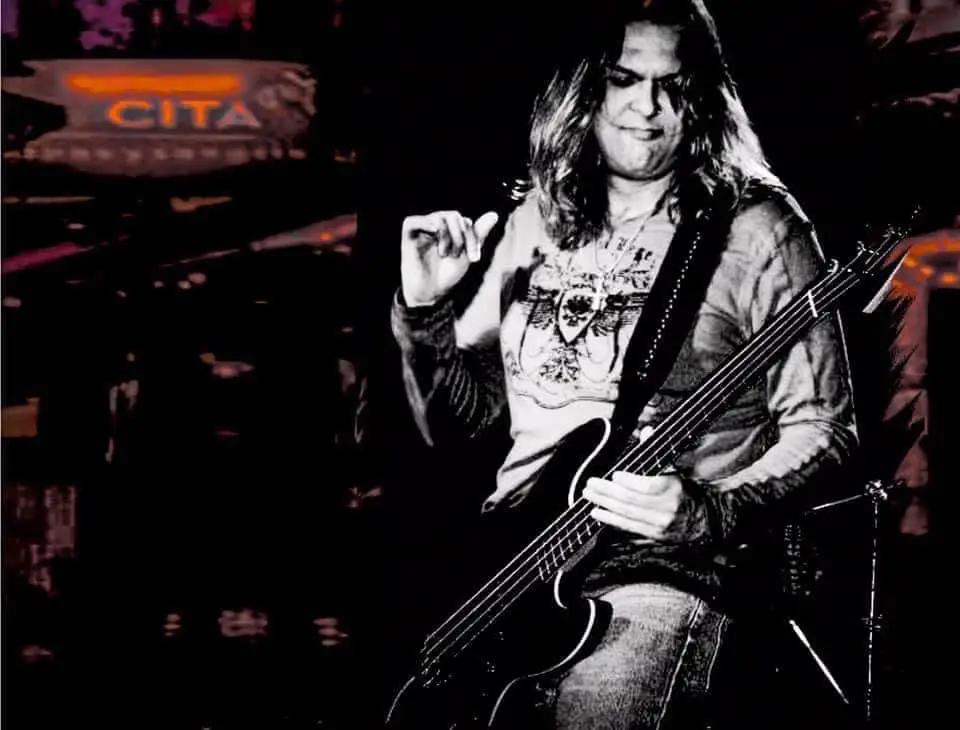All images courtesy of Ronnie Robson

By Andrew Daly
andrew@vinylwriter.com
Recently, I caught up with veteran bassist Ronnie Robson of the Holywood Monsters, and others. Among other things, we touch on Ronnie’s origins, his reason for first picking up the bass, joining the Hollywood Monsters, working with Vinny Appice, his work as a producer, and a whole lot more.
If you would like to learn more about Ronnie Robson, the link to his webpage is here. Once you’ve checked that out, dig into this interview with Ronnie. Cheers.
Andrew:
Ronnie, thanks for taking the time. From a young age, what first gravitated you toward music?
Ronnie:
Music has always been my happy place. Growing up, there was always a radio on, or discs on the record player, both in our home and my grandparent’s home as well. My parents would always throw parties and everyone would eat, drink, and dance, with lots of friends and relatives in attendance. Music was non-stop in our household. My uncle Roy was a songwriter and played piano. He had severe muscular dystrophy but managed to play/compose music for big band leaders like Moxy Whitney and Guy Lombardo – he was my hero and a huge inspiration to me at a young age. My sister Darlene and I learned to play the piano and I believe I was six years old when I started taking piano lessons. We had a piano in our house to practice so we developed quickly.
Andrew:
What first drew you to the bass, and who were your early influences?
Ronnie:
I was coming back shopping with my father and we were listening to the radio in the car. The song was Stevie Wonder’s “I Wish,” from the album Songs in the Key of Life. I noticed the bass right away and it intrigued me, standing out in the arrangement not only in the beginning but throughout the entire song. I started listening to the bass (the rhythm section), in all songs, no matter what genre and artist. When I was a little older, I started playing guitar in various bands, and it seemed that these bands never had a killer rhythm section like I wanted to hear (and feel). A friend of mine who lived close by was a drummer (first and foremost), and had a bass laying around so we would get together and jam it out for hours. I knew almost immediately that I would make a better impact with any band I played in, as a bass player, understanding the importance of the rhythm section, to drive the band. And I have never looked back. My early influences were John Paul Jones (Led Zeppelin), James Jamerson (The Funk Brothers/Motown), Nathan Watts (Stevie Wonder), and Paul McCartney (The Beatles/Wings). In my teenage years, it was definitely Geezer Butler (Black Sabbath/Heaven and Hell), and Rudy Sarzo (Quiet Riot/Ozzy/Whitesnake). Now, almost grown-up, I think everything that “Flea” does (Red Hot Chili Peppers), is amazing.
Andrew:
Do you recall your first paid gig as a musician?
Ronnie:
I was twelve years old and filling in on drums for my friend’s band at Greenhurst Dance Pavilion. It was technically a non-paying gig but after the performance, I talked to the venue owner “Wolf,” and he said that I was solid and fun to watch, and asked how long I have been playing live. I advised him that this show was my first gig, so he said, “Let me pay you for your first gig to make you a pro,” handing me a triple shot of lemon gin and ten bucks. I still to this day don’t think the other band members got the same deal and it was an interesting walk home, trying not to let my parents know that I was drunk. [Laughs].

Andrew:
I wanted to hit on some highlights of your long career, but first, what led you down the path of a touring and session musician?
Ronnie:
Out of high school, I didn’t know what I wanted to do, school or career-wise. My friend landed me a job working in a Toronto recording studio and I would assist on set-up and engineering, and it didn’t take me long to be working on my own, mostly nights, weekends, and holidays. I would often sit in on sessions mainly for the reasons of “band mate no-shows,” adding bass, drums, or key tracks to the recordings so that their sessions wouldn’t be wasted. I would also work with individual artists who wanted to add various instruments to their recordings. The word got around that I was a pretty good session player, and I then started to be asked to go into rehearsals with artists for song development. The definite highlight of my career has been with the Hollywood Monsters.
Andrew:
What advantages has being a session man afforded you that perhaps being in a band might not?
Ronnie:
I would say; peace and tranquility for the most part. Since I have my own recording studio, I have the ability to work on my own, with no pressures, no expeditious scheduling, personality, or business issues to deal with. I am on my own schedule, love the ability to listen to the song I am about to record, decide on how I am going to approach, try a few things, then perhaps go cut the grass, shovel the snow, vacuum the house, make myself something to eat, have a martini, think about the song a bit more, try out ideas on a few parts, then get back into recording the various parts, and sending out the tracks when complete, all with production notes. Although I would love to play in an established band to record and tour, I am very happy where I am right now.
Andrew:
Touching on the Hollywood Monsters now. How did that band of all stars come together?
Ronnie:
The Monsters were formed by Steph Honde in Los Angeles California in 2013, and he decided to form his own group by bringing in well-known musicians to record his songs and covers. For the first two albums, Steph brought in Don Airey, Tim Bogert, Danko Jones, Paul Di’Anno, Neil Murray, Jenny Haan, Tony Franklin, Tracy G, Craig Goldy, Vinny Appice, etc. I previously worked with Steph on a few covers, not under the Hollywood Monsters banner, and then talking one day, he was wondering what to do next, career wise, the next project, and I advised him to do another Hollywood Monsters album. I said that I would help out with bass, recording, and production. He had enough original material to make it happen, and we went back and forth on what covers we would record and who would perform on each song. About a year later, Thriving on Chaos was released.
Andrew:
How would you say the band progressed from one album to the next?
Ronnie:
When Steph and I decided to go forward with the next Monsters album, I listened to the first two albums, they were pretty much in line with what we wanted to do. They were heavy but with a classic rock feel that would come with production. Steph has stated that Thriving is the best Hollywood Monsters album, and I am very proud to have been part of that project.

Andrew:
Thriving on Chaos was a great record, but my understanding is that the band is no more. What led to its demise?
Ronnie:
Without any speculation whatsoever – never say never for the Hollywood Monsters to return. Every person involved has their own projects, or bands and it became clear that the Monsters were just going to be what it is after Thriving was released. We were also planning to tour in Canada and the North Eastern United States with a great lineup of Steph (guitar, vocals), Tracy G (lead guitar), Vinny Appice (drums), and myself (bass), for the summer of 2020, and we were getting a lot of interest from club/venue owners, then COVID hit, and of course, the tour never happened. The world is now opening back up, and I would like to put this lineup together under the Hollywood Monsters banner for a European tour. So, never say never.
Andrew:
I’ve heard you mention before that your favorite artist to record with is Vinny Appice. Dig into that for me. How did you first meet Vinny, and what is it about his style that works so well with yours?
Ronnie:
Taking a step back to 2007. I took my wife to see Heaven and Hell with Megadeth opening. And who knew that a few years later, I would be recording with three members out of both bands, Vinny Appice, Glen, and Shawn Drover. I thought both drummers were outstanding at that show – they both brought down the house. I was delighted that Steph Honde brought in Vinny to do tracks for Thriving on Chaos. Steph did scratch drum tracks, and then Vinny would track his parts and send them back to us. Every time I would receive various Vinny tracks, I would just smile, he would perform flawlessly and I found it very easy to groove with him, his drum groove/notations/fills – we knew they were coming before they happened. Vinny is an outstanding talent and a great guy. Also, Glen Drover has brought Vinny in on the upcoming “Hollentor” album – a Glen Poland project – who happens to be an amazing talent, both as a guitarist and songwriter. I played bass on the first album. Check them out; the new album has many great players on it. When Vinny and his brother Carmine Appice come to Toronto to perform “Drum Wars” with vocalist Jim Crean, I think I’m going to ask for a quick guest spot. [Laughs].
Andrew:
Having been in the game for so long, you’ve obviously met a lot of people along the way. As a touring musician, which tour or tours stick out most, and why?
Ronnie:
Definitely my first tour still sticks out as the best. As a young musician, right out of high school I was in a band named “Suite Six.” It was a great band, and we were getting a lot of attention at home in Toronto. So we decided to take the show on the road. We hired an agent, who immediately took us on and we were playing gigs all over Ontario, Quebec, and into the US. The American leg of the tour included various parts of New York, Jersey, Connecticut, PA, Indiana, Ohio, and Michigan. We rented a cube van with all of our equipment, a few lawn chairs, luggage, coolers and headed out. We had so much fun, but problems presented themselves one after another.
There were border headaches, and my vocalist and I were brought into “secondary” for nearly six hours because he had a big mouth and a problem with authority. There were money management problems, apparent substance abuse issues, and tour management mix-ups with various venue managers. We were “Suite Six” but only four members in the band, so some of the venue owners/management felt that they were being ripped off, with some refusing to pay the balance for our show. We tried to save money by sleeping in the van some evenings, spent way too much on party supplies, got speeding tickets, booted from hotels, booted from restaurants, and tried to figure out the various logistical errors on our own, when instead we should have been going through the agent, etc. When we got back to Toronto, we had three dollars left and I didn’t get paid my dollar. But we rocked it, the shows were absolutely perfect, and we learned a lot about ourselves as humans and musicians.
Shortly after that tour, I went to college and received my business degree, started hanging out with successful people in the music industry, and started asking all kinds of questions to learn the business as quickly as I could. This tour was the best because it was our first learning experience. We were in our very late teens, not old enough to drink in some states (then), going through certain survival modes to make the tour successful, but having a great time that none of us would have changed. We still laugh when we get together which always ends up bringing back certain memories. A certain word or a phrase and no one knows what the hell we are talking or laughing about.

Andrew:
Vinny Appice aside, which studio sessions are most memorable, and why?
Ronnie:
I would have to say recording bass to a drum track from the late (and great) Ted McKenna, who has recorded/performed with Greg Lake, Michael Schenker, Ian Gillan, and Rory Gallagher. Steph Honde had a track with his drums and completely wrote another song around the drum parts, shortly after Ted’s death. I was beside myself when I received the email from Steph with the newly written song around Ted’s previously recorded drums. I had seen Ted perform a few times with Schenker, and was always blown away by his style of playing and personality on stage. He was as cool as a Scottish cucumber.
Andrew:
Your prowess as a session man and gun for hire is apparent, but have you ever been approached by any notable bands to join? Any notable auditions? If so, who were you competing against?
Ronnie:
I have been approached by a few notable bands’ management teams. It’s always an inquiry for possible interest, moreso as, “We might need a bass player to fill in for a few dates on tour. Would you be cool to audition on short notice” type of thing. Not by the artist themselves, but their management. I haven’t really placed or put myself out that way throughout the years but more so in the last four. The last thing of real interest for me was when I received a call from Glen Drover (ex-Megadeth), and he wanted to put a band together to play some gigs and have some fun. Glen and I lived fairly close to one another, would get together for lunch, rip up the restaurant patios, rarely talked about music or the music business. We’re just friends getting together to chill and relax for the moment, and enjoying each other’s company.
As far as ending up as recording bandmates, I was more than interested in what he wanted to do next, musically, and the possibilities of getting us both out of the house. Glen brought in his brother Shawn on drums, also Tim “Ripper” Owens, (ex-Judas Priest), on vocals for a short tour called A Night Of Metal. We decided on the songs, I practiced the hell out of them (no actual band rehearsals would take place – we all do our homework beforehand), and about a little more than a week away from the first gig, I developed a growth in my inner right eye, which had me looking and feeling like a beast. They ended up bringing in bassist Adrian Robichaud (Eidolon), to fill in on short notice. I’ve been approached (in the last few years), by a few notable musicians to form a “side band” with other notables, to tour outside of what we are all doing as our base. Let’s see what happens since I’ve been thinking about this for a few months now, touring.
Andrew:
Do you miss playing live?
Ronnie:
I do miss performing live sometimes. I think a perfect situation for me (at this moment), would be to form a band with well-known players in my area. Thinking I would have to place musicians together that I know would jive immediately, and that live relatively close to one another. Of course, it would have to be when they’re not touring, and I’m clear from the studio. We could all get together to play the odd live date, do some great covers, have some fun, and rock the crowd.
Andrew:
Any musicians that you have in mind?
Ronnie:
That’s a tough one. The guys I know that would jive musically would be Danko Jones on guitar/vocals, John Lalley, who is the drummer from Bootsauce fame, Dan Todd, and also ex-Platinum Blonde, Barry Stock from Three Days Grace on lead guitar, and perhaps we can throw in Rick Jackett on a third guitar. Rick is from Finger 11 and is former Rainbow Butt Monkeys. Actually, this would be a great band. I think we’d totally kick it. [Laughs]. One Canadian band I’d love to perform with is Big Sugar, what Gordie Johnson has done over the years has been amazing.
Andrew:
How would you say your style and approach have evolved over the years? Do you evolve out of necessity, or creative desire?
Ronnie:
Out of total creative desire for sure. Looking back on projects and also looking forward, my entire recording evolution has come on as an ebb and flow, since every project is different with immediate style, personality, focus, and a certain direction, one day to the next, one aspect from the source to the next, one wants/desires to the next. It’s so nice these days to take a step back from my personal projects, working with other artists in production and their development.

Andrew:
Tell me about the upcoming book, Titans of Bass. How did you become involved, and what’s gone into it?
Ronnie:
I am completely honored to be part of this publication. It began by receiving an email from the author KJ Jensen, where he said that he wanted to add me. He asked me to write advice on practice, performing for upcoming bass players, and in his message, he stated the other bassists that had already committed such as: Justin Chancellor (Tool), Billy Sheehan (Mr. Big), Ron Carter, John Patitucci, Geezer Butler (Black Sabbath), Nathan East, Snow Owl, Abraham Laboriel, Sean Lennon, Leland Sklar, George Porter Jr., Christian McBride, Jack Casady, Stuart Hamm, Verdine White, and Bill Laswell (just to name a few). The book comes out in August, and I have received messages from friends, and family that they have already pre-ordered.
Andrew:
You’re also pretty handy as a cover artist too, right? What’s in the works there?
Ronnie:
I am taking it easy these days. I’m in the studio three to four days a week and getting ready to record some great covers with some amazing people from around the world. I have my fingers in a few pies at the moment, not only tracking bass and piano, but lots of post-audio engineering (film), and audio mastering, which I love.
Andrew:
One of the last things I wanted to hit on is your work as a producer and your studio. How did you enter that space?
Ronnie:
Let’s just say that the universe called and I answered. A good friend of mine, Ricky Singh, who is a working actor/comedic performer reached out to me nine months ago and advised that he purchased an existing music rehearsal facility. It has six rooms that are fully equipped, and a sound stage at the rear of the space for film, photography, and live performances. He wanted me to move my recording studio to the space, and after checking it out, I immediately agreed. The studio is located in Vaughan, just north of Toronto. Not only am I a mixing engineer, post-audio engineer, producer, session and touring musician, but I’m also now a roadie, helping other musicians with in-rehearsal studio PA mixes, as well as their own gear, including pedal boards.
Andrew:
Last one. After being in the game for as long as you have, what goals do you still have that you’d like to accomplish before it’s all said and done? What’s next?
Ronnie:
Beyond getting back on stage and rocking in front of a live audience, and recording on various artists’ albums as a guest, I have expanded my talents in the film and television realm, and in the various aspects of sound design and full audio production. Teaming up with Ricky, with him being immersed in film, television, and live comedy (full time), it’s been the perfect jump-start that I needed to become more professionally involved in a very busy Toronto showbiz market. I’m very happy to be working in the arts on a daily basis, and I’m absolutely loving my life at the moment.

– Andrew Daly (@vwmusicrocks) is the Editor-in-Chief for www.vwmusicrocks.com and may be reached at andrew@vinylwriter.com





Leave a Reply